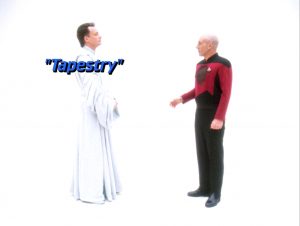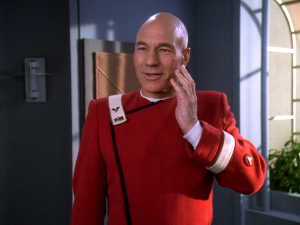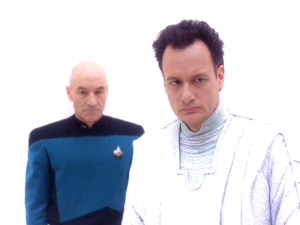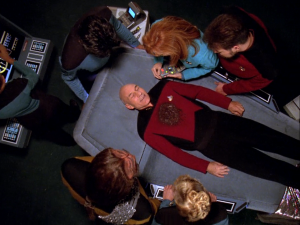Star Trek: The Next Generation is thirty years old this month! To celebrate, Redeeming Culture is assembling the finest crew of culture redeemers from all over the internet to investigate the spiritual harmonies in this cornerstone of science fiction.
For more about Trektember, read our preview post. Please note that there are minor plot spoilers for this episode below.
Reel World Theology’s Mark Wingerter takes a look at what might have been in Season 6, episode 15: Tapestry.
• •
 I first saw Tapestry when I was a kid, and to be honest, I don’t quite remember much about my first viewing. What I most recall initially delighting in was the playfulness of Q egging on Picard with his usual devious plots; most memorably Picard waking up in bed next to Q, and him showing up as a messenger with flowers for “a John Luck Pick-ard.” Still makes me laugh every time. Though it contains many personal favorite moments for me, “Tapestry” has become my favorite episode of the series; more for the resonance its message has had as I have revisited it throughout my life.
I first saw Tapestry when I was a kid, and to be honest, I don’t quite remember much about my first viewing. What I most recall initially delighting in was the playfulness of Q egging on Picard with his usual devious plots; most memorably Picard waking up in bed next to Q, and him showing up as a messenger with flowers for “a John Luck Pick-ard.” Still makes me laugh every time. Though it contains many personal favorite moments for me, “Tapestry” has become my favorite episode of the series; more for the resonance its message has had as I have revisited it throughout my life.
[pullquote class=”left”]Tapestry examines the central theme of the entire Star Trek franchise: the discovery of our personal natures.[/pullquote]Tapestry examines the central theme of the entire Star Trek franchise: the discovery of our personal natures. For all the new worlds and civilizations that the Enterprise boldly goes to find, ultimately the journey presents us new ways to examine who we are as individuals. It seems simple, but that’s what great science fiction all boils down to. In order to see what makes us ourselves, sometimes we have to take a look at our nature in a different form. That may look like a green-skinned alien, or a post-apocalyptic world, or in this case, a parallel universe where we chose to make a few different decisions.
Q: This is your opportunity to make peace with your sordid past.
 The episode is basically Star Trek’s version of It’s A Wonderful Life, the Jimmy Stewart holiday classic (the idea of Q as Clarence the guardian angel makes me giggle). Picard is given the chance to make some different decisions in his youth; and once he does, the Picard we know so well, Captain of Starfleet’s flagship, no longer exists. Instead, he becomes “a dreary man in a tedious job” who “never ever gets noticed by anyone.” This is the result of him becoming someone who is “bereft of passion and imagination.” Whereas Picard begins the episode having regrets about decisions from his past, he ultimately comes to realize that every piece of himself matters. The good and the bad.
The episode is basically Star Trek’s version of It’s A Wonderful Life, the Jimmy Stewart holiday classic (the idea of Q as Clarence the guardian angel makes me giggle). Picard is given the chance to make some different decisions in his youth; and once he does, the Picard we know so well, Captain of Starfleet’s flagship, no longer exists. Instead, he becomes “a dreary man in a tedious job” who “never ever gets noticed by anyone.” This is the result of him becoming someone who is “bereft of passion and imagination.” Whereas Picard begins the episode having regrets about decisions from his past, he ultimately comes to realize that every piece of himself matters. The good and the bad.
Tapestry is a microcosm of the pervading message of Star Trek, which repeatedly cries out “We matter.”
 Just as we see in episodes like “The Measure of a Man,” “I, Borg,” “The Inner Light,” “Lower Decks,” and so so many others throughout the series, there is a celebration here of the little things that make us individuals. Picard nearly dies due to his artificial heart, one that he received after what he originally calls “a mistake” from his youth. Of course, Q pounces on that: What if he could undo that mistake? What would that make him? We can all ask ourselves these questions. Do our decisions condemn us? Or do they actually benefit us in the end, making us not just who we are, but who we needed to be all along?
Just as we see in episodes like “The Measure of a Man,” “I, Borg,” “The Inner Light,” “Lower Decks,” and so so many others throughout the series, there is a celebration here of the little things that make us individuals. Picard nearly dies due to his artificial heart, one that he received after what he originally calls “a mistake” from his youth. Of course, Q pounces on that: What if he could undo that mistake? What would that make him? We can all ask ourselves these questions. Do our decisions condemn us? Or do they actually benefit us in the end, making us not just who we are, but who we needed to be all along?
These existential questions have been wrestled over for centuries, and likely will continue to be until that future stardate when humanity discovers warp drive (we can hope, right?). How do we begin to answer them? Maybe we can’t, but the Gospel gives us a guide to navigate our exploration of them.
 Picard thinks that Q’s offer to make peace with his past means changing that past. Instead, he realizes that his past mistakes don’t condemn him, because without them he wouldn’t be the Picard we know. The peace he makes comes with embracing those mistakes and moving forward. A life without condemnation is the gift of the gospel, and it allows us to be at peace with our decisions, both good and bad. We therefore can live freely knowing we are what God intended us to be, no matter what that looks like.
Picard thinks that Q’s offer to make peace with his past means changing that past. Instead, he realizes that his past mistakes don’t condemn him, because without them he wouldn’t be the Picard we know. The peace he makes comes with embracing those mistakes and moving forward. A life without condemnation is the gift of the gospel, and it allows us to be at peace with our decisions, both good and bad. We therefore can live freely knowing we are what God intended us to be, no matter what that looks like.
Picard: There are many parts of my youth that I’m not proud of. There were loose threads, untidy parts of me that I would like to remove. But when I pulled on one of those threads it unraveled the tapestry of my life.
 We can only imagine what the universe really holds. Star Trek gives us a fascinating supposition, for sure, but I’m guessing there are some pretty untidy things out there in the vast beyond; something like the oozing entity in “Skin of Evil” comes to mind. Glossing over that truth, however, won’t change the fact that it exists. Paul reminds us in Romans of our own untidy things, stating that we all fall short of the glory of God—but immediately after this he reminds us that we’re justified through grace. We are redeemed. We therefore don’t have to gloss over untidy things, wishing they didn’t exist. We can use our imperfections for a greater purpose. Say, exploring the galaxy in harmony, perhaps.
We can only imagine what the universe really holds. Star Trek gives us a fascinating supposition, for sure, but I’m guessing there are some pretty untidy things out there in the vast beyond; something like the oozing entity in “Skin of Evil” comes to mind. Glossing over that truth, however, won’t change the fact that it exists. Paul reminds us in Romans of our own untidy things, stating that we all fall short of the glory of God—but immediately after this he reminds us that we’re justified through grace. We are redeemed. We therefore don’t have to gloss over untidy things, wishing they didn’t exist. We can use our imperfections for a greater purpose. Say, exploring the galaxy in harmony, perhaps.
Laying on my living room floor watching “Tapestry” for the first time as a child, I was too young to fully understand how my life would be woven together by every decision- the good and the bad, the exciting and the boring. But stories like this one, of redemption obtained despite our faults, reflects an eternal longing within us all that I come to learn more about as I grow older. Every thread in our individual tapestries has great value. That value only increases when, in Christ, we do no stand condemned for the untidy ones. Star Trek may not have been written by Christians, but it continually presents Christocentric pictures of redemption like this one throughout its stories. It shows that we matter eternally. Once we learn this, we discover the new life that we seek out. It is then that we can live. Boldly.
• • •
Thanks for reading Trektember on Redeeming Culture. David Atwell is back tomorrow with a pursuit of truth – a Chase, if you will. Join us!
• • •
Mark Wingerter is a writer and filmmaker from Greensboro, NC. He is also in the middle of another series about Star Trek: The Next Generation on Reel World Theology and can be heard, along with David and Mikey, on the TNG episode of that podcast. He is analytical, perhaps too much so, and therefore must share his opinion in a variety of creative outlets. He is very thankful for those who put up with it, most of all his wife, Sarah. You can feed that addiction by following him on Twitter at @MarkWingdinger.

